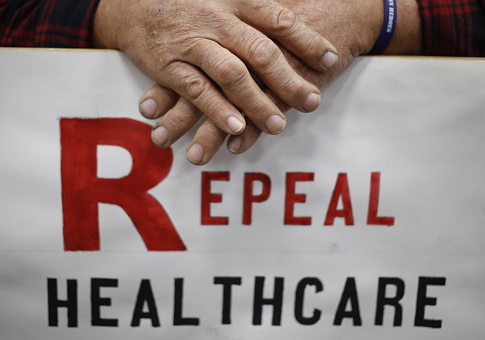The majority of Democratic senators facing reelection in 2018 in red states have not introduced any legislation that would replace or reform Obamacare.
The senators who are up for reelection in states that lean conservative are Sen. Jon Tester (D., Mont.), Sen. Clare McCaskill (D., Mo.), Sen. Joe Manchin (D., W.Va.), Sen. Heidi Heitkamp (D., N.D.), Sen. Sherrod Brown (D., Ohio), Sen. Bill Nelson (D., Fla.), Sen. Joe Donnelly (D., Ind.), Sen. Bob Casey (D., Pa.), Sen. Tammy Baldwin (D., Wis.), and Sen. Debbie Stabenow (D., Mich.).
Of these 10 senators, only three have introduced legislation aiming to make conservative reforms to the Affordable Care Act.
Sen. Heitkamp introduced the Small Business Stability Act, which attempts to weaken the Affordable Care Act's mandate on small businesses by allowing employers with fewer than 100 employees to have an option for voluntary health coverage. She also introduced the Commonsense Competition and Access to Health Insurance Act, which would allow health insurance to be sold across state lines.
"The health care reform law isn't perfect," Heitkamp said. "I have long said there are some good pieces of the law and some pieces that need to be fixed."
Sen. Manchin introduced a bill to delay the individual mandate under Obamacare, which requires that individuals purchase health coverage or pay a penalty to the IRS.
"I have always opposed the individual mandate, and I continue to have concerns with the implementation of the Affordable Care Act and the cost and choices West Virginianas will have in the health care exchanges," Manchin said.
Sen. Casey introduced the Medicare Beneficiary Preservation Choice Act, which attempted to change the Affordable Care Act by allowing recipients to change plans in the first three months.
"This legislation makes a simple change to existing law that can be a big help to older Americans who want to change their Medicare Advantage plans," said Casey. "This is an example of a change that can be made to improve the health care law that has broad support."
Casey also introduced the Pregnancy Assistance Fund Expansion Act, which would amend Obamacare by creating additional funding for pregnant and parenting teens and women.
The seven remaining Democratic senators—Tester, McCaskill, Brown, Nelson, Donnelly, Baldwin, and Stabenow—have all expressed support for the Affordable Care Act and opposition to the American Health Care Act, the Republican replacement legislation to Obamacare.
While Sen. Tester has said he is open to repealing and replacing the Affordable Care Act, he neither introduced any legislation that would reform it nor supports the American Health Care Act.
"There were plenty of mistakes made with the [Affordable Care Act], there's no doubt about that," Tester said. "It hasn't been improved. We can either work to improve that or repeal it and replace it with something better. I'm open to either one."
Tester said the Republican replacement is a step backwards.
"I think we need to make sure we're improving things and not taking a step backwards, because if we get into the area of shifting costs again, where people don't have insurance and they get sick, or they end up having an accident and not being able to pay for that health care, somebody else is going to pay for it."
Sen. McCaskill, like Tester, does not support the American Health Care Act, calling it a disaster.
"Trumpcare is a disaster for Missouri, and for the 24 million Americans who in the next 10 years would lose health insurance because of it," said McCaskill. "It would only really help insurance companies, their highly-paid CEOs, and the very wealthy."
Sen. Sherrod Brown said the Republican replacement is heartless and bad for his state of Ohio. "This bill threatens the health care coverage of nearly 1 million Ohioans, including 200,000 currently battling addiction, and allows companies to jack up prices on people with preexisting conditions like asthma and diabetes," he said.
Both senators Nelson and Baldwin wrote a letter to Senate Majority Leader Mitch McConnell (R., Ky.) to not take up the American Health Care Act.
"The bill removes the requirement that insurers provide minimum levels of coverage for the cost of covered services, which will mean that consumers will have to pay more out-of-pocket for their health care needs," the senators wrote. "This, coupled with insufficient premium tax credits, the repeal of the cost-sharing subsidies, and high-risk pools, will substantially hinder access to care for those with mental health and substance abuse disorders."
Sen. Donnelly said that the Republican replacement was "disastrous." "This bill would make it tougher and more expensive for people—including those with preexisting conditions—to get coverage, harder to access opioid and heroin treatment programs, and raise premiums on older Americans," he said.
Even though Sen. Stabenow said she was "committed to working across the aisle to lower health care costs," she said she would strongly oppose the AHCA.
"House Republicans instead passed a plan today that would raise costs for Michigan families, eliminate protections if you or a family member has a preexisting condition like cancer or a heart condition, and take us back to the days when insurance companies were in charge of your health care."
The Washington Free Beacon reached out to the ten senator's offices for comment. Sen. Brown's office replied with a statement criticizing the AHCA and Sen. Heitkamp's office replied with legislation she has worked on to reform Obamacare. No other office responded.
